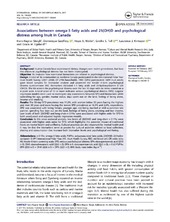| dc.contributor.author | Skogli, Hans-Ragnar | en_US |
| dc.contributor.author | Geoffroy, Dominique | en_US |
| dc.contributor.author | Weiler, Hope A | en_US |
| dc.contributor.author | Tell, Grethe S. | en_US |
| dc.contributor.author | Kirmayer, Laurence J | en_US |
| dc.contributor.author | Egeland, Grace M | en_US |
| dc.date.accessioned | 2017-08-14T11:24:15Z | |
| dc.date.available | 2017-08-14T11:24:15Z | |
| dc.date.issued | 2017 | |
| dc.Published | Skogli H, Geoffroy D, Weiler HA, Tell GST, Kirmayer, Egeland GM. Associations between omega-3 fatty acids and 25(OH)D and psychological distress among Inuit in Canada. International Journal of Circumpolar Health. 2017;76:1302684 | eng |
| dc.identifier.issn | 1239-9736 | |
| dc.identifier.uri | https://hdl.handle.net/1956/16276 | |
| dc.description.abstract | Background: Inuit in Canada have experienced dietary changes over recent generations, but how this relates to psychological distress has not been investigated. Objective: To evaluate how nutritional biomarkers are related to psychological distress. Design: A total of 36 communities in northern Canada participated in the International Polar Year Inuit Health Survey (2007–2008). Of 2796 households, 1901 (68%) participated; 1699 Inuit adults gave blood samples for biomarker analysis and answered the Kessler 6-item psychological distress questionnaire (K6). Biomarkers included n-3 fatty acids and 25-hydroxyvitamin D (25(OH)D). The K6 screens for psychological distress over the last 30 days with six items scored on a 4-point scale. A total score of 13 or more indicates serious psychological distress (SPD). Logistic regression models were used to investigate any associations between SPD and biomarkers while controlling for age, gender, marital status, days spent out on the land, feeling of being alone, income and smoking. Results: The 30-day SPD prevalence was 11.2%, with women below 30 years having the highest and men 50 years and more having the lowest SPD prevalence at 16.1% and 2.6%, respectively. SPD was associated with being female, younger age, not being married or with a common-law partner, spending few days out on the land, feelings of being alone, smoking and low income. Low levels of both 25(OH)D and long-chain n-3 FAs were associated with higher odds for SPD in both unadjusted and adjusted logistic regression models. Conclusion: In this cross-sectional analysis, low levels of 25(OH)D and long-chain n-3 FAs were associated with higher odds ratios for SPD, which highlights the potential impact of traditional foods on mental health and wellbeing. Cultural practices are also important for mental health and it may be that the biomarkers serve as proxies for cultural activities related to food collection, sharing and consumption that increase both biomarker levels and psychological well-being. | en_US |
| dc.language.iso | eng | eng |
| dc.publisher | Taylor & Francis | eng |
| dc.relation.uri | https://www.ncbi.nlm.nih.gov/pmc/articles/PMC5497537/pdf/zich-76-1302684.pdf | |
| dc.rights | Attribution CC BY | eng |
| dc.rights.uri | http://creativecommons.org/licenses/by/4.0 | eng |
| dc.subject | Aboriginal health | eng |
| dc.subject | Kessler | eng |
| dc.subject | K6 | eng |
| dc.subject | omega-3 | eng |
| dc.subject | vitamin D | eng |
| dc.title | Associations between omega-3 fatty acids and 25(OH)D and psychological distress among Inuit in Canada | en_US |
| dc.type | Peer reviewed | |
| dc.type | Journal article | |
| dc.date.updated | 2017-07-17T13:15:15Z | |
| dc.description.version | publishedVersion | en_US |
| dc.rights.holder | Copyright 2017 The Author(s) | |
| dc.identifier.doi | https://doi.org/10.1080/22423982.2017.1302684 | |
| dc.identifier.cristin | 1482443 | |
| dc.source.journal | International Journal of Circumpolar Health | |

